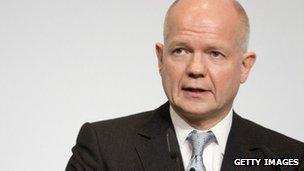William Hague: Britons' EU disillusionment deepest ever
- Published

William Hague said the European Union needed flexibility to suit its members' needs
The British public's disillusionment with the European Union is "the deepest it has ever been", Foreign Secretary William Hague has warned.
In a speech in Germany, he said people felt they did not "have a say" over decision-making in Brussels.
Unless the system changed it would become "democratically unsustainable", he added.
The comments come as eurozone countries attempt to integrate their banking systems to prevent further crises.
These will not directly affect the UK, where the Bank of England will retain control over banks, but Prime Minister David Cameron promised on Monday to defend national interests.
He recently told MPs that a referendum would be the "simplest" solution if the UK's relationship with the EU changes substantially.
'One-way process'
In a speech at Berlin's Korber Foundation, Mr Hague said: "This coalition government is committed to Britain playing a leading role in the EU but I must also be frank - public disillusionment with the EU in Britain is the deepest it has ever been.
"People feel that in too many ways the EU is something that is done to them, not something over which they have a say."
Mr Hague criticised the previous Labour government's decision to agree to the Lisbon Treaty without holding a referendum.
He said: "The way in Britain Lisbon was ratified without any consultation of the voters has played a part in that.
"People feel that the EU is a one-way process, a great machine that sucks up decision-making from national parliaments to the European level until everything is decided by the EU. That needs to change.
"If we cannot show that decision-making can flow back to national parliaments then the system will become democratically unsustainable.
"It is obviously in Britain's interests for the EU to succeed in the tasks I have described and for Britain to play a leading role in it.
"The eurozone countries must do what they must to resolve the crisis, but the way forward for the EU as a whole is not more centralisation and uniformity but of flexibility and variable geometry, that allows differing degrees of integration in different areas, done in ways that do not disadvantage those that do not wish to participate in everything, and preserves the things we all value."
'Not simple'
Mr Hague added: "There are three great problems of Europe's future we need to solve if we are to ensure that a wider the European Union has the flexibility, the legitimacy and the agility to succeed in the 21st century.
"First, how we structure the EU when many countries want differing kinds of integration and still preserve the EU's essential unity. Second, how we deal with the problem of democratic legitimacy and accountability of decision-making in the EU, which is a growing concern in most member states.
"Third, how we get the right balance of what the EU does do or doesn't do. These are not simple matters."
On Monday, Mr Cameron insisted that the UK would "stick to our guns" over the EU's budget, by vetoing any increase above the rate of inflation.
The European Commission is seeking a one trillion euro budget for 2014-20, equating to 1.1% of the 27-nation bloc's gross income.
The German government has denied reports that Chancellor Angela Merkel is prepared to cancel next month's EU summit unless Mr Cameron lifts his veto threat.